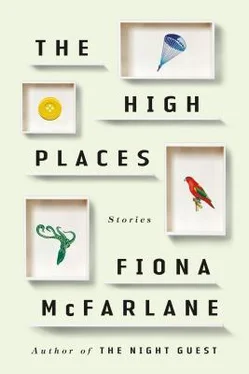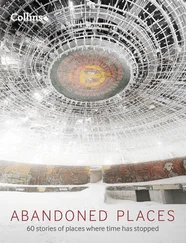‘Started as a blister, then an ulcer,’ said Mr Ronald. ‘Just a mishap. A blister from new shoes. No one tells the young: be careful of your feet. Feet should last a lifetime. What can be prevented? Everything, they say. No they don’t. They say not everything.’
He laughed harder now, in a thin straight line, and his cheeks drew in over the laugh so that Sarah could see the shape of his skull and the crowded teeth, nicotine-stained, that swarmed in his mouth. Perhaps this wasn’t laughing, but breathing. The steady rain and wind moved the car slightly, back and forth. The branches of the tree against which the car was pressed were darting shapes at the corner of Sarah’s eye, like Sheba at night, stalking rats with his stomach full of jellymeat.
(Sheba lay panting in the corner of his cage, overwhelmed by the pain on which he concentrated with a careful doling out of attention. He kept himself steady but his small side rose and fell, rose and fell, higher and then deeper than it should. His eyes moved toward the door and his mouth sat open, showing pink.)
Mr Ronald’s laugh was a clatter behind his teeth. Sarah huddled close to him as he moved against his seat. She placed her arm around his shoulders, touched his damp forehead, and felt her hair lift away from her skin, all along her arms and the back of her neck. The summer passed through the car, windy and wet.
‘Hold on,’ said Sarah. ‘Just hold on.’ Her mouth was close to his ear. David would come soon. You could swear at a cat that rocked this way, crowded close in pain and confusion; you could talk softly, not to the cat but to the idea of the cat, to the faces of the family to whom you must explain the cat’s condition. You could sing to the cat and if you had forgotten its name you could call it ‘kitty’ — you could say ‘Hold on, kitty’ while your hands moved and your neck craned forward and the parts of you that understood the machinery of a cat, its secret places, worked despite the cat’s terror. You could set the leg of a monkey and watch it, later, as it limped back and forward across the surgery floor, scowling and shaking its funny fist at you.
Noises came from Mr Ronald’s throat now, and these sounds seemed accidental, the by-product of something else. They continued past the point Sarah felt certain he had died; they rattled on in the can of his throat. After they had subsided — although this took time, and they came in unexpected spurts — she became aware of the sound of a radio playing. In her own car, or this one? Who could Douglas be? A son? A grandson?
Sarah was unsure how long she had been sitting beside Mr Ronald and how long it had been since he stopped making any sound at all. His wife cleaned the walls of their shower and he had been to see orangutans in Berlin. He was too young to have been in that war.
Without warning, David filled up the space in the passenger door of Mr Ronald’s car. She had been so certain she would hear his footsteps on the road, but here he was in the doorway as if she’d summoned him out of the field.
‘I’m sorry, I’m sorry, I didn’t find anyone.’ He was wet and his breath came quickly. ‘I ran and finally found a house but there was no one home. I thought about breaking in. Kept going for a bit but no sign of life. No cars on the road, even. So I came back to try the car again.’
He looked at the stillness of the man in the driver’s seat. He saw the blood on Mr Ronald’s trousers and the way that it crept toward his belt and shirt, and he searched for blood on Sarah.
Sarah concentrated on David’s face, which swam in the sound of the rain and the radio. My husband. She smiled because she was happy to see him. Then she placed the wallet in Mr Ronald’s lap. She moved to step out of the car and David made space for her.
‘How is he? How does he seem?’
When a cat died during an operation, when a macaw was too sick, when a snake was past saving, then Sarah must tell its owners. It was difficult to tell them this true thing, and so along with it she added other, less true things: that the tumour caused no pain, that the animal hadn’t been frightened to go under anaesthetic. Still, it was difficult. It made no difference to Sarah that words were inadequate to her enormous task. Of course they were. There might be a time when she would have to tell her friends, Sheba’s owners, that he wouldn’t survive his infection. Each loss of which she had been the herald seemed to have led to this new immensity: Mr Ronald, dead in a car. But they didn’t know Mr Ronald. David had never even spoken to him. She had been married that midday, with no rain. There were only two witnesses.
‘He’s dead,’ said Sarah.
She stood and shut the door behind her. David fought the desire to lower his head and look through the window. It seemed necessary to make sure, but more necessary to trust Sarah. He held his hands out to her and she took them.
‘My god,’ he said. She shook her head. He knew that when she shook her head in this way, it meant: I’m not angry with you, but I won’t talk.
‘What now?’ he asked. ‘Should we take him somewhere?’
David felt that Sarah owned the wreck, owned the tree and piece of road on which Mr Ronald had died, and that he need only wait for her instructions, having failed to find help. He thought of her sitting alone with the unconscious body of an old man, and he thought of the moment at which she must have realised that Mr Ronald was no longer unconscious, but dead. David saw with certainty that Sarah was another person, completely separate from him, although he had married her today. His wife.
‘We’ll try the car again,’ said Sarah. ‘We just have to get to the surgery.’
‘We can use the phone there,’ said David.
Sarah crossed the road and he followed her. She didn’t look back at the wreck. Waiting on its grassy rise slightly above the road, their car had a look of faithful service, of eagerness to assist. It started on the third try with a compliant hum. Sarah had always been better at coaxing it; even before trying the ignition she’d known it would work. She was unsure if this resurrection was good or bad luck, or beyond luck — simply inevitable. Now that she could see the rain in the headlights, she realised how soft it was, how English. She missed home, suddenly: the hard, bright days and the storms at the end of them, with rain that filled your shoes.
It grew bright and then dark in Mr Ronald’s car as their headlights passed over him, and it remained dark as they left that piece of road and that tree. David watched Sarah drive. They didn’t speak. As the distance between their car and Mr Ronald’s grew, it seemed that the roads were all empty — that all of England was empty. It lay in its empty fields while the mice moved and the airplanes flew overhead to other places, nearby and far away.
They reached lit buildings and the surgery so quickly that David was embarrassed at having failed to find help. Sarah walked calmly, and she spoke calmly with the nurse about Sheba. She didn’t look at the telephone. There was no blood on her clothes. David watched his wife as she made her way toward the cat, who rubbed his head against the bars of his cage. He was waiting for the pain to stop. And then he would be let out, healed, to hunt mice in the wet grass.
Henry Taylor had always known he would have money one day, and this confidence was vindicated when his mother won the lottery on a Thursday in the August of 1961. He could afford to get married. But he wasn’t yet sure if he could afford to quit his job, so he went to the office the day after he heard the news. The sun came through the window blinds in long tedious slats and time passed outside, far below, with the noise of the road and the joy of boys on bicycles. Above, where Henry was, women walked among the men, delivering coffee and papers. They were all decorous, even the young ones — even those reproachable few who lingered with one hip against the corners of desks. One particular girl had caught Henry’s attention. She was new to her job, but had already made a name for herself with her prettiness and good nature. She dressed modestly, with a sense of pleasures offered all the same: a heightening of her body’s secrets through her polite attempts to conceal them. Her name was Eleanor, and she called herself Ellie.
Читать дальше












